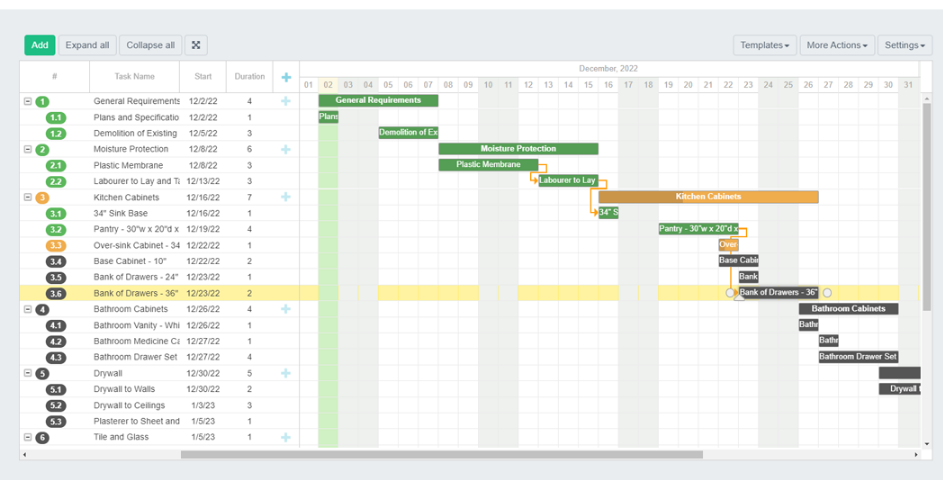Introduction:
In the fast-paced world of construction, managing project timelines and resources effectively is crucial. With the complexity of modern construction projects, scheduling software has become an indispensable tool for contractors, project managers, and engineers. The right scheduling software helps streamline workflows, improve efficiency, and ensure that projects are completed on time and within budget. In this article, we’ll explore the top features, benefits, and the importance of scheduling software in construction.
Why is Scheduling Software Essential in Construction?
Scheduling software is more than just a tool for organizing tasks—it is a critical element in the success of construction projects. With multiple tasks, teams, and deadlines to manage, having a centralized tool helps:
- Prevent Delays: With real-time tracking, scheduling software allows teams to adjust schedules dynamically and stay on track.
- Improve Resource Allocation: Allocate resources efficiently, ensuring that materials, equipment, and labor are available when needed.
- Enhance Communication: Real-time updates allow teams and stakeholders to stay informed and aligned, reducing the chances of errors.
By using scheduling software, construction businesses can manage their projects more effectively, improving both the short-term and long-term success rates.
Key Features of Scheduling Software for Construction Projects
Scheduling software for construction comes with several features that are specifically designed to meet the demands of the industry:
Gantt Chart Integration
Gantt charts visually represent a project’s schedule. They are a core feature in most construction scheduling software. By breaking down tasks into smaller, manageable parts, project managers can see the dependencies between different tasks, which is vital for minimizing delays.
Resource Management
A top feature of scheduling software is resource management, which allows for tracking labor, equipment, and materials. Effective management ensures resources are allocated efficiently and prevents over-allocation or underutilization.
Mobile Compatibility
Construction sites are dynamic, and managers are often on-site. Having mobile-compatible scheduling software means updates can be made in real-time, improving the accuracy and timeliness of project data.
Collaboration Tools
With multiple teams working on different aspects of a project, collaboration tools within scheduling software allow for seamless communication between project managers, contractors, and workers.
Benefits of Scheduling Software in Construction
Using scheduling software provides several advantages for construction projects:
Reduces Errors and Miscommunication
Manual scheduling can lead to errors, missed deadlines, and miscommunication. Scheduling software reduces these risks by automating the scheduling process and providing real-time updates to all stakeholders.
Increases Efficiency
Scheduling software speeds up the planning process, allowing project managers to complete schedules faster and more accurately. The software can also identify scheduling conflicts early, reducing downtime.
Cost Management
By optimizing schedules, construction companies can reduce labor and material costs, keeping projects within budget.
Scalability for Large Projects
For large construction projects with multiple teams, scheduling software can scale to meet the demands of complex timelines and resource management. As projects grow, the software adapts to handle more data without compromising efficiency.

How to Choose the Best Scheduling Software for Your Construction Project
With so many scheduling tools available, choosing the right one can be overwhelming. Consider the following factors when selecting scheduling software for your construction business:
Project Size and Complexity
If you are managing a small residential project, a simple tool might suffice. For large commercial projects, look for robust software that handles multiple teams, tasks, and resources.
Integration with Other Tools
Ensure that the software integrates seamlessly with other tools you are using, such as budgeting software or project management tools. Integration simplifies data management and ensures accurate project tracking.
User-Friendly Interface
The software should be easy to navigate for all users, from project managers to field workers. A user-friendly interface minimizes the learning curve and reduces the chance of errors.
Customer Support and Training
Look for a software provider that offers strong customer support and training resources. This ensures your team can get the most out of the software from day one.
Top Scheduling Software for Construction Projects in 2025
Here are some of the best scheduling software tools for construction in 2025:
Buildertrend
Buildertrend is a popular choice for construction project management, offering tools for scheduling, budgeting, and communication. It’s especially beneficial for residential construction projects.
Procore
Procore is a robust construction management platform that includes powerful scheduling features. Its integration with other tools like CAD software makes it a go-to for large commercial projects.
CoConstruct
CoConstruct is known for its ease of use and features specifically designed for custom builders. It offers scheduling features that allow real-time updates and resource management.
Challenges and Limitations of Scheduling Software
While scheduling software offers numerous benefits, there are some challenges and limitations:
Training Requirements
Despite being user-friendly, there may still be a learning curve for some team members. Proper training is essential to ensure the software is used effectively.
Cost
Some advanced scheduling software can be expensive. It’s important to consider both the initial cost and ongoing maintenance fees when choosing a software solution.
FAQs About Scheduling Software for Construction
1. What is the best scheduling software for small construction businesses?
For small projects, simpler tools like Buildertrend or CoConstruct are great options. These tools are user-friendly and affordable.
2. Can scheduling software integrate with my current project management tools?
Yes, many scheduling software solutions offer integrations with popular project management tools like Procore and Trello.
3. Is scheduling software compatible with mobile devices?
Most modern scheduling software is mobile-compatible, enabling real-time updates and on-site collaboration.
4. Does scheduling software improve communication on construction sites?
Yes, it provides real-time updates and notifications, ensuring everyone is on the same page.
5. Can scheduling software handle large-scale construction projects?
Yes, robust tools like Procore and Buildertrend can scale to handle complex, large-scale construction projects.
6. How can scheduling software reduce delays in construction?
By providing real-time updates, tracking resources, and identifying conflicts early, scheduling software helps minimize delays.
Conclusion
In conclusion, scheduling software is an essential tool for construction companies looking to improve efficiency, reduce costs, and stay on track with timelines. By choosing the right software, construction professionals can enhance project communication, optimize resource allocation, and ultimately ensure the success of their projects. Whether you’re working on a small residential build or a large commercial development, the right scheduling software will play a key role in your success.


